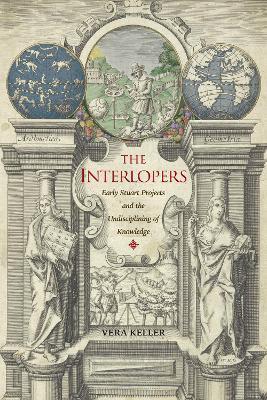The Interlopers: Early Stuart Projects and the Undisciplining of Knowledge

The Interlopers: Early Stuart Projects and the Undisciplining of Knowledge
A reframing of how scientific knowledge was produced in the early modern world.
Many accounts of the scientific revolution portray it as a time when scientists disciplined knowledge by first disciplining their own behavior. According to these views, scientists such as Francis Bacon produced certain knowledge by pacifying their emotions and concentrating on method. In The Interlopers, Vera Keller rejects this emphasis on discipline and instead argues that what distinguished early modernity was a navigation away from restraint and toward the violent blending of knowledge from across society and around the globe.
Keller follows early seventeenth-century English "projectors" as they traversed the world, pursuing outrageous entrepreneurial schemes along the way. These interlopers were developing a different culture of knowledge, one that aimed to take advantage of the disorder created by the rise of science and technological advances. They sought to deploy the first submarine in the Indian Ocean, raise silkworms in Virginia, and establish the English slave trade. These projectors developed a culture of extreme risk-taking, uniting global capitalism with martial values of violent conquest. They saw the world as a riskscape of empty spaces, disposable people, and unlimited resources.
By analyzing the disasters--as well as a few successes--of the interlopers she studies, Keller offers a new interpretation of the nature of early modern knowledge itself. While many influential accounts of the period characterize European modernity as a disciplining or civilizing process, The Interlopers argues that early modernity instead entailed a great undisciplining that entangled capitalism, colonialism, and science.
PRP: 598.33 Lei
Acesta este Prețul Recomandat de Producător. Prețul de vânzare al produsului este afișat mai jos.
478.66Lei
478.66Lei
598.33 LeiLivrare in 2-4 saptamani
Descrierea produsului
A reframing of how scientific knowledge was produced in the early modern world.
Many accounts of the scientific revolution portray it as a time when scientists disciplined knowledge by first disciplining their own behavior. According to these views, scientists such as Francis Bacon produced certain knowledge by pacifying their emotions and concentrating on method. In The Interlopers, Vera Keller rejects this emphasis on discipline and instead argues that what distinguished early modernity was a navigation away from restraint and toward the violent blending of knowledge from across society and around the globe.
Keller follows early seventeenth-century English "projectors" as they traversed the world, pursuing outrageous entrepreneurial schemes along the way. These interlopers were developing a different culture of knowledge, one that aimed to take advantage of the disorder created by the rise of science and technological advances. They sought to deploy the first submarine in the Indian Ocean, raise silkworms in Virginia, and establish the English slave trade. These projectors developed a culture of extreme risk-taking, uniting global capitalism with martial values of violent conquest. They saw the world as a riskscape of empty spaces, disposable people, and unlimited resources.
By analyzing the disasters--as well as a few successes--of the interlopers she studies, Keller offers a new interpretation of the nature of early modern knowledge itself. While many influential accounts of the period characterize European modernity as a disciplining or civilizing process, The Interlopers argues that early modernity instead entailed a great undisciplining that entangled capitalism, colonialism, and science.
Detaliile produsului










